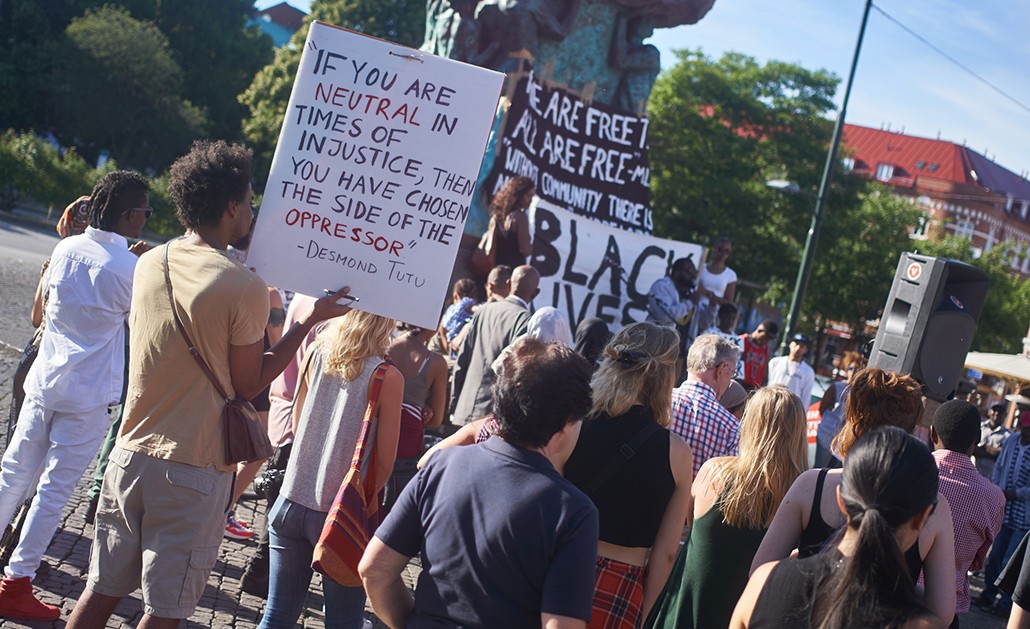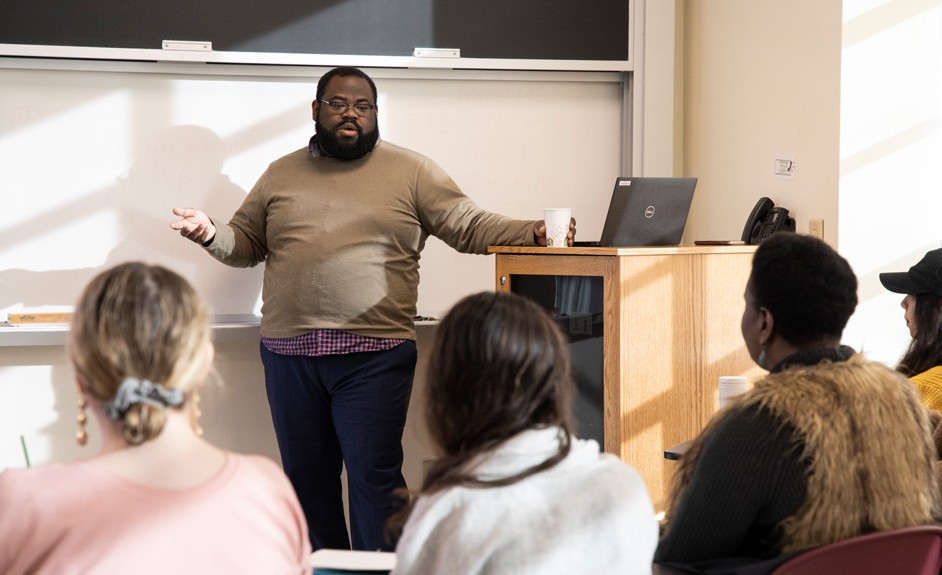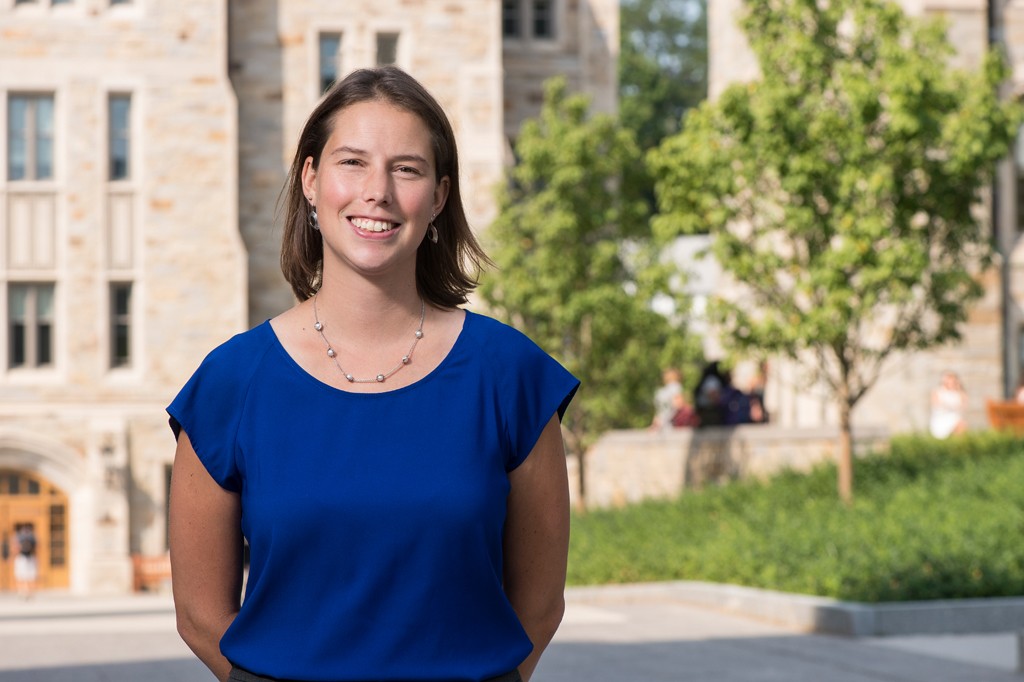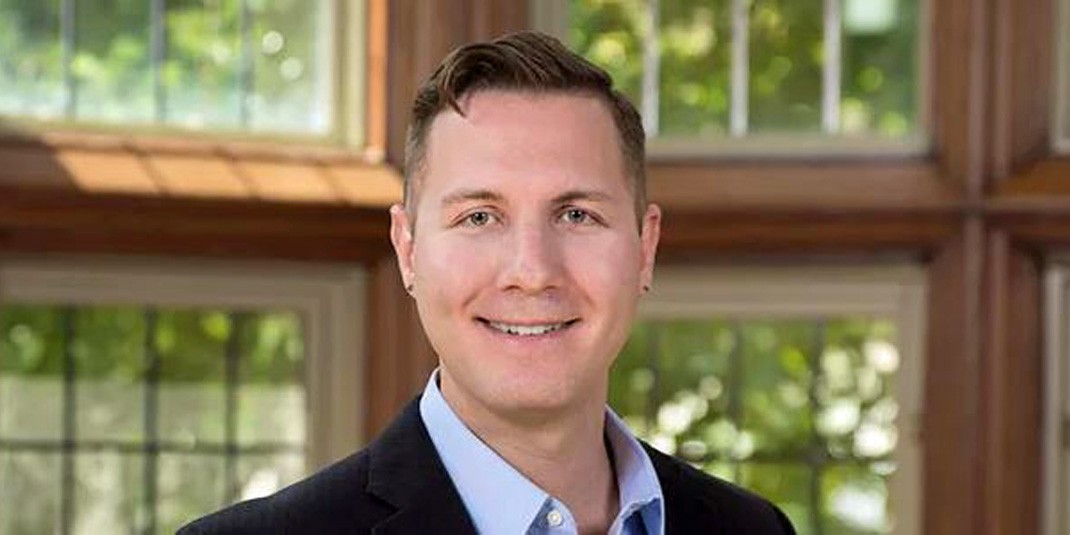
People protest at a Black Lives Matter rally. Photo from iStock by Jedraszak.
Samuel Bradley, Jr. looked into the eyes of the 22 students enrolled in “Creating the Inclusive Workplace” and realized that his lecture on the wage gap between men and women needed to wait.
It was June 3, and the recent deaths of George Floyd, Breonna Taylor, and Ahmaud Arbery had sparked protests against anti-black racism across the globe and amplified calls to reimagine the way policing works.
“I could tell students needed to process what was happening in the world around them,” says Bradley, an assistant professor in the Boston College School of Social Work. “They felt a deep sense of grief regarding the murders of George Floyd, Breonna Taylor, and Ahmaud Arbery, and they wanted to talk about the things they could be doing in their internships and jobs to make a difference.”
Instead of discussing the wage gap, students discussed strategies to train their colleagues to fight racism in the workplace. They examined ways to reshape hiring practices to increase diversity. And they asked what they should read in order to better understand racism against black people. Bradley, who facilitated the discussion over Zoom, suggested The Black Power Movement and American Social Work by Joyce M. Bell, which provides a framework for understanding how social movements shape civil society.

Samuel Bradley, Jr., an assistant professor in the School of Social Work. Photo by Chris Soldt.
A large group of students, led by Chelsea Kamuene, wrote a letter to Keith Ellison, the attorney general of Minnesota. Ellison is prosecuting the four police officers who were on the scene in Minneapolis when one of them pinned Floyd to the ground with a knee for 8 minutes and 46 seconds while Floyd pleaded “I can’t breathe.”
“The anger, pain, and exhaustion felt by our protesters may have resulted in some physical damages, but corrupt police officers leave both a physical and emotional pain that is unrepairable,” the students wrote to Ellison. “Prosecuting all four officers to the fullest for participating in a racist inhumane act will not adversely impact your reputation nor the lives of other police officers. This will create a path to enforcing etiquette training and policies that are humane towards communities of color.”
Bradley’s course represents one example of the ways in which students and faculty in the School of Social Work have reshaped classes and reimagined assignments in the wake of the unjust killings of Floyd, Taylor, and Arbery. Their efforts lie at the heart of the school’s promise to respond to anti-black racism by designing curriculum that specifically supports black communities and doubling down on the Equity, Justice, and Inclusion Initiative, in which students, faculty, and staff harness their skills, knowledge, and experiences to develop policies and practices that promote a caring, respectful, and inclusive culture.
Members of the EJI initiative, which launched two years ago, will focus specifically on generating proactive strategies to dismantle racism, says Gautam N. Yadama, dean of the School of Social Work.
“We should take the opportunity to address racial injustice systemically, at every turn and interaction, in the context of our courses, initiatives, and add new facets to our social work curriculum,” Yadama said in a letter to students, faculty, staff, and alumni on June 1. “We cannot wait any longer. This grand challenge of race and racism needs our unwavering attention.”

Samantha Teixeira, an assistant professor in the School of Social Work.
‘We have to pay attention to the systemic racism that happens every day in this country’
When students in “Creating the Inclusive Workplace” were examining strategies to promote equality at work, their peers in “Community Organizing and Political Strategy” were reflecting on the ways in which policies, procedures, and neglect have oppressed black communities.
One group of students discussed how tens of millions of Americans are drinking contaminated water, especially those in black communities in cities like Milwaukee, Wisconsin, and Flint, Michigan. Nearly 9 percent of children in Milwaukee are poisoned by lead in the city’s water supply, according to a report published by the Wisconsin Department of Health Services in 2014.
“All the numbers are there, but people turn a blind eye to them,” says Sebastien Saint-Pierre, a student enrolled in “Community Organizing and Political Strategy.” “We have to pay attention to the systemic racism that happens every day in this country.”
Samantha Teixeira, an assistant professor who teaches the course, says that she has enabled students to reshape assignments in response to the civil unrest sparked by the killing of Floyd in police custody. One student, she says, is preparing to call civic leaders, participate in rallies, and raise money for the Black Lives Matter movement as part of her final presentation.
“The students have been hungry for conversations and actions,” she says. “I’m inspired by their bravery and their willingness to speak openly and challenge me and our institution.”
In her class on June 3, Teixeira advised her students to amplify the voices of people who have been most affected by the scourge of racism. As future community organizers, she told them, they need to learn when to step forward to speak and when to step back to listen.
Teixeira, who studies the social, political, and economic factors that shape the lives of young people who live in Boston, explained how she navigates the situation when it comes up in her research. “When you have privilege to be at a table that affects youth but where youth aren’t present, that’s a really important moment to step forward for youth and not be silent,” she says. “When youth are at the table, that’s the time to pass the mic to them.”
Teixeira shared a range of resources with her students, including a list of strategies to address systemic racism during this time of physical distancing. The strategies, including tactics to get pointed messages to trend on Twitter, exemplify the focus of her course: to introduce students to the methods community organizers use to shed light on social issues. “Our values force us to not conduct business as usual,” she says, “but to shine a spotlight on injustices.”

Cal Halvorsen, an assistant professor in the School of Social Work.
‘A call to end punitive policing is a call to end policing as we know it’
Cal Halvorsen, an assistant professor, says he worked with a group of students and faculty to reshape “Basic Skills in Macro Practice” into a course that will more clearly focus on issues related to equity, justice, and inclusion.
The course, which Halvorsen will teach in the fall, will require students to read more news stories, op-eds, and peer-reviewed articles written by people of color. One new reading, a report issued by the Urban Institute, a think tank based in Washington, D.C., presents a four-pronged solution to overcoming structural racism.
One of the strategies calls for police departments to reform their practices in order to help end anti-black racism in the criminal justice system. Black people made up 13 percent of the population in the United States in 2018, but they represented 27 percent of all people arrested, according to the Uniform Crime Reporting Program run by the FBI. And the Urban Institute has found that black adults are nearly six times as likely to be incarcerated as white adults.
“Given the excessively harsh nature of this country’s policing practices and the overwhelming burden they place on people of color,” the report says, “a call to end punitive policing is a call to end policing as we know it.”
Halvorsen says students will have the opportunity to draw upon their own experiences to tackle social justice issues like racism and the contamination of the environment, which disproportionately harms black and brown people.
“Our courses, by themselves, will not solve racial injustice,” he says. “Yet by including content that explicitly addresses racial injustice and content from individuals and communities who have experienced these injustices, our students—and our future social workers—will be armed with more relevant and actionable knowledge and skills to work to change our incredibly complex social systems.”


